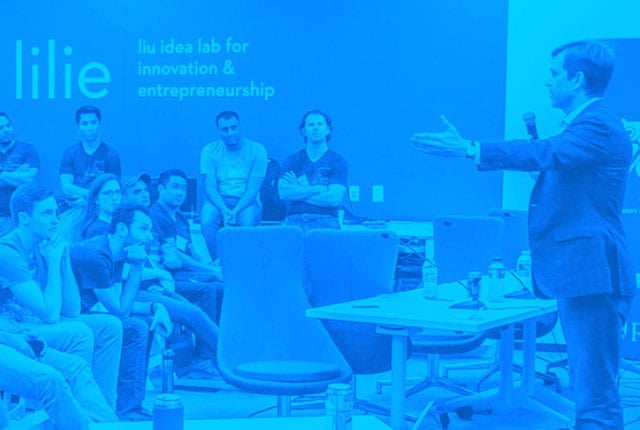The Liu Idea Lab for Innovation and Entrepreneurship (Lilie) has introduced the 2025 Rice Innovation Fellows cohort, a dynamic group set to lead the future of scientist- and engineer-driven spinout ventures from Rice University labs.
Launched in 2022 as one of President Reginald DesRoches’ inaugural entrepreneurship initiatives, the Rice Innovation Fellows program equips doctoral students and postdoctoral researchers with the tools, training and support to transform groundbreaking ideas into impactful ventures.
“Our fourth cohort of fellows spans multiple industries addressing the most pressing challenges of humanity,” said Kyle Judah, Lilie’s executive director. “We see seven Innovation Fellows and their professors with the passion and a path to change the world. We’re excited to stand shoulder to shoulder with them and our new Commercialization Fellows every step of the way.”
The program helps participants turn breakthrough research into real-world impact by exploring industry applications in partnership with campus labs. Through Lilie, fellows receive equity-free funding, coworking space and a year of tailored education and mentorship. Alumni have raised over $20 million in funding and grants, joined the Activate and Chain Reaction Innovations fellowships and entered top programs such as the Texas Medical Center’s Cancer Therapeutics Accelerator and Rice Biotech Launch Pad.

“The Innovation Fellows program helps scientist-led startups accelerate growth by leveraging campus resources — from One Small Step grants to the Summer Venture Studio accelerator — before launching into hubs like Greentown Labs, Helix Park and Rice’s new Nexus at The Ion,” said Yael Hochberg, head of the Rice Entrepreneurship Initiative and the Ralph S. O’Connor Professor in Entrepreneurship. “These ventures are shaping Houston’s next generation of pillar companies, keeping our city, state and country at the forefront of innovation in mission critical industries.”
The 2025 fellows are doctoral students and postdocs with research breakthroughs that show serious commercial promise in materials science and nanoengineering, bioengineering and applied physics and chemistry.
2025 Rice Innovation Fellows
Chen-Yang Lin, Materials Science and Nanoengineering, Ph.D. ’25
Professor Jun Lou’s Laboratory
HEXAspec is a startup focused on creating cutting-edge thermal management solutions for artificial intelligence (AI) chips and high-performance semiconductor devices. HEXAspec aims to address critical challenges in the semiconductor industry, specifically the growing need for effective heat dissipation as AI technologies continue to evolve.
Sarah Jimenez, Bioengineering, Ph.D. ’27
Professor Camila Hochman-Mendez Laboratory
Jimenez’s research focuses on making transplantable hearts out of decellularized animal heart scaffolds in the lab and designing then manufacturing an automated cell delivery system to recellularize our hearts with patient-derived stem cells.
Alexander Lathem, Applied Physics and Chemistry, Ph.D. ’26
Professor James M. Tour Laboratory
Lathem’s research is focused on bringing laser-induced graphene (LIG) technology from academia into industry. This material can be adapted for electronics, sensing and biological applications. Lathem aims to use laser systems to mass-produce LIG templates for such applications, making graphene a major part of tomorrow’s industrial economy.
Dilrasbonu (Bonu) Vohidova, Bioengineering, Ph.D. ’27
Professor Omid Veiseh Laboratory
Vohidova’s research focuses on engineering therapeutic cells to secrete immunomodulators, aiming to prevent the onset of autoimmunity in Type 1 diabetes. By encapsulating these cells in biocompatible materials, Vohidova strives to develop a long-term, targeted therapy that safeguards pancreatic islets while preserving the immune system’s natural defenses.
Alexandria Carter, Bioengineering, Ph.D. ’27
Professor Michael King Laboratory
Carter is developing a device that can revolutionize personalized patient disease diagnostics as well as improve molecular and cellular biology understanding via high throughput 3D culturing of organoids, tumor spheroids and clustered metastatic models using the power of superhydrophobicity.
Alvaro Moreno Lozano, Bioengineering, Ph.D. ’27
Professor Omid Veiseh Laboratory
Lozano’s work focuses on developing new technologies for Type 1 Diabetes patients by leveraging novel biomaterials and cell engineering with the goal to fabricate a bioartificial pancreas that can control blood glucose levels.
Lucas Eddy, Applied Physics and Chemistry, Ph.D. ’25
Professor James M. Tour Laboratory
Eddy specializes in building and using electrothermal reaction systems for nanomaterial synthesis, waste material upcycling and per- and polyfluoroalkyl substances (PFAS) destruction. He was the first person to use rapid flash Joule heating to destroy toxic PFAS and is working to scale this technique further to remediate PFAS in the field in a variety of soil types.
2025 Commercialization Fellows
Mor Sela Golan, Bioengineering, Ph.D.
Professor Omid Veiseh Laboratory
Golan’s research focuses on biomaterial cell therapy for treating lymphedema. Leveraging her expertise in nanotechnology and targeted drug delivery systems, she aims to contribute to innovative biomedical solutions addressing unmet clinical needs.
John Li, Chemistry, Materials Science and Nanoengineering, Ph.D.
Professor James M. Tour Laboratory
Li has been working for James Tour’s research group since 2018, and he studied nanotechnology in three leading research groups at Rice and Stanford University. His experiences involve leading business model innovation in STEM research, development and commercialization.
Andrew “AJ” Walters, Bioengineering, Ph.D.
Professor Caleb Bashor Laboratory
Walters’ research focuses on bringing the advances in genetic engineering and synthetic biology to mesenchymal stem cell-/stromal cell-based therapy with the ultimate goal of building an accessible allogeneic cell therapy that can be deployed across a wide range of inflammation disorders. Eventually this approach could be applied to other indications such as cancer.
Barclay Jumet, Mechanical Engineering, Ph.D.
Professor Dan Preston Laboratory
Jumet’s research focuses on developing wearable technologies made solely from textiles and fluids, enabling smart wearables without any need for unwashable and cumbersome electronics.
Alisha Menon, Electrical Engineering, Ph.D.
Professor Jacob Robinson Laboratory
Menon’s research explores integrated circuits for in-sensor processing, learning and recognition of physiological signals, states and processes. She focuses on designing hardware for machine learning specifically for biosignals, enabling multilayer feedback systems with complex intelligence shown with a multimodal neural prosthetic.
For more information about Rice Innovation Fellows, visit entrepreneurship.rice.edu/innovation-fellows

